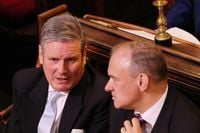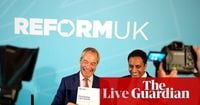At the Liberal Democrats’ annual conference in Bournemouth on September 22, 2025, party leader Sir Ed Davey delivered a message that was as combative as it was reflective of the political moment: the Liberal Democrats, he insisted, have a "moral duty" to keep Nigel Farage and Reform UK out of power. With Reform UK, led by the ever-controversial Farage, surging in recent opinion polls and Labour and the Conservatives losing ground, the conference unfolded against a backdrop of shifting allegiances and a palpable sense of urgency among the Lib Dem faithful.
According to the BBC, Sir Ed Davey told party members and reporters, "We have got to take the fight to Reform." He argued that the Liberal Democrats offered the kind of "radical change... in tune with British values" that could serve as a credible alternative to both the "failed" Labour government and the right-wing populism of Farage, which he likened to "Trump's America." Davey’s remarks drew a sharp line between his party’s vision for the country and the direction he believes Reform UK would take it, saying, "I think that’ll be harsh and it’s not true to British values."
The numbers from the last general election, as reported by The Guardian, provide a sense of the stakes: the Liberal Democrats won 72 seats, a record haul for the party, while Reform UK secured just five. Yet, in the months leading up to the conference, Reform UK has consistently led in national opinion polls, prompting Davey to acknowledge that while the Lib Dems have "momentum," it’s "not quite reflected in the polls as much as I would like to see."
One of the conference’s most visible, if tongue-in-cheek, symbols of the Lib Dems’ focus on Farage was the distribution of build-your-own Lego Nigel Farage sets—complete with accessories like a 'Make America Great Again' hat and a pint glass. The gesture, reported by ITV News, was both a light-hearted jab and a signal of the seriousness with which the party views the threat from Reform UK.
But there’s more to the Lib Dems’ strategy than cheeky stunts. Sir Ed Davey and his team have rolled out a "Reform Watch" scrutiny unit, led by local councillors, to counter Reform UK’s growing national attention. Mike Ross, leader of Hull City Council, described how the party is reframing Reform’s opposition to net zero goals as a direct threat to green investment in areas like Hull. Meanwhile, Kent councillor Anthony Hook stressed the need to "up our game and create more content of our own" on social media to challenge Reform UK’s digital dominance.
Despite the Lib Dems’ recent successes, including their best general election result in over a century, there remain challenges. As ITV News highlighted, the party’s gains have been concentrated in the South, with only one Lib Dem MP—Tom Gordon—representing a seat in Yorkshire. Gordon admitted the perception of the Lib Dems as a "southern and middle class" party is a "valid concern," and he expressed a commitment to increasing the number of working-class candidates in the North.
Underlying the conference’s debates was a broader conversation about British identity and patriotism. Former leader Tim Farron took to the stage wrapped in the national flag, part of a theme of "reclaiming patriotism." When pressed about the proliferation of flags on streets across the region, Sir Ed Davey struck a conciliatory note: "If the local community wants the flags, they should have the flags... the flag belongs to everybody, whatever your political persuasions, and we should be proud of our country."
Yet, for all the talk of values and identity, the conference was also marked by hard policy debates—none more contentious than immigration. On the same day, Nigel Farage held a press conference to unveil Reform UK’s latest proposals: abolishing indefinite leave to remain (ILR) for migrants, replacing it with a tougher, renewable work visa, and restricting welfare benefits to British citizens only. Farage claimed, according to The Guardian, that "large-scale migration into Britain, where 50% at least of those that come, will never work and live off the British state, is actually making this country substantially poorer." He insisted that the UK’s welfare system would go bankrupt without "massive cuts" and that only British citizens should receive benefits.
Reform UK’s Zia Yusuf confirmed the party’s intention to strip settled status from foreign nationals, replacing it with stricter requirements, and banning those with criminal convictions from entering the UK. The proposals, however, drew swift criticism from experts and political opponents. The Centre for Policy Studies, whose research was cited to justify Farage’s claim of £230 billion in savings, withdrew the figure on the same day, stating that "the overall cost estimates should no longer be used." Critics, including the Labour Party, called the plan "half-baked" and questioned its credibility.
Concerns about breaching agreements with the EU and the potential for mass deportations have also been raised, with Sunder Katwala of the British Future thinktank warning that the proposals could amount to "remigration," a policy with troubling historical echoes. Even among Leave voters, there is broad consensus that those already settled in the UK should not have their rights revoked.
Back in Bournemouth, Sir Ed Davey positioned the Liberal Democrats as the only party capable of "seeing off the threat posed by Reform UK." In interviews with The Guardian and the BBC, he said, "I think the threat to our democracy, to things we hold dear, British values – decency, tolerance, respect for the rule of law – are being challenged in a way that I can’t remember before." Davey claimed that the Lib Dems were "the only party beating [Reform] in local council byelections," boasting, "Since May, I think we’ve had head to head fights with them. We’ve won three quarters of them. We’re the only party who’s not lost a seat to Reform."
When pressed repeatedly about whether he would consider a coalition with Labour to keep Reform UK out of government, Davey sidestepped the question, stating instead, "My moral responsibility as the leader of a party that has particular values is to speak up for those values and champion those values." A straw poll at the conference revealed little appetite among Lib Dem members for a formal coalition with Labour, underscoring the party’s desire to chart its own course.
Beyond the Farage factor, the conference also saw Davey renew his criticism of tech mogul Elon Musk and the social media platform X (formerly Twitter). Davey accused Musk and his company of breaking UK law by removing teams responsible for child safety, leading to "adverts for videos of child sexual abuse" appearing on the platform. He called for Parliament to investigate Musk’s conduct and for new regulations to protect children online, including cigarette-style health warnings on social media apps and a "doomscrolling cap" to limit endless content feeds.
As the conference drew to a close, the Liberal Democrats faced a daunting but clear challenge: to translate their rhetoric and policy proposals into real electoral gains, especially in regions where Reform UK’s appeal is strongest. Whether their blend of moral messaging, policy focus, and targeted campaigning will be enough to blunt Farage’s rise remains to be seen. But one thing is certain: the battle lines for Britain’s political future are being drawn with unusual clarity—and, for the Lib Dems, the fight is just beginning.


